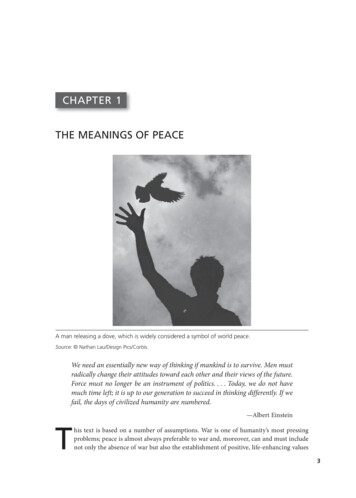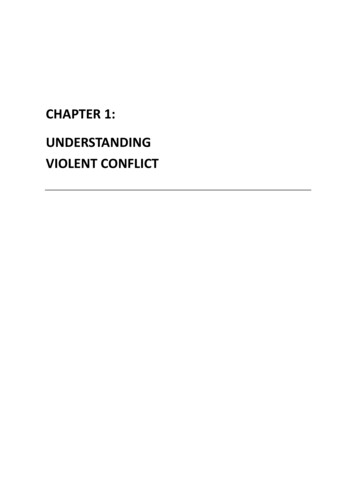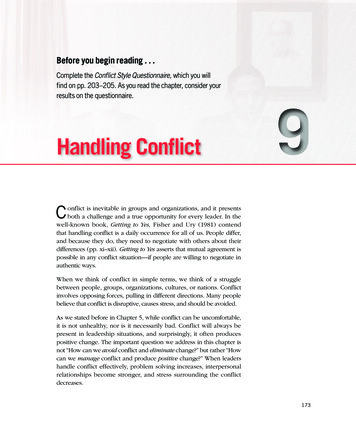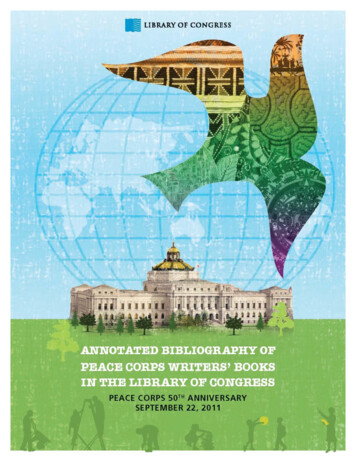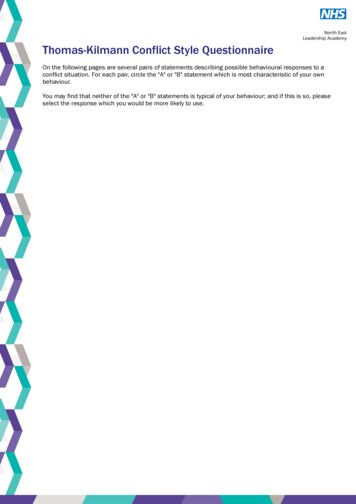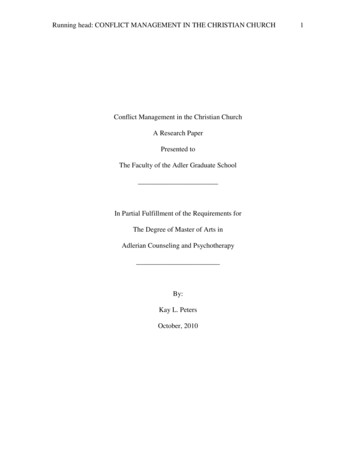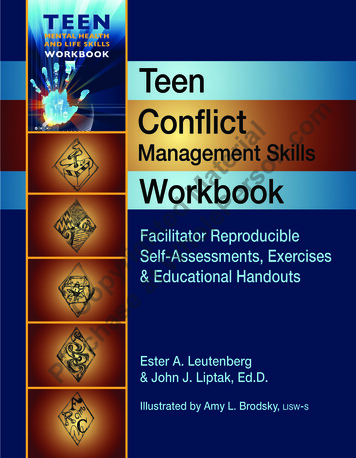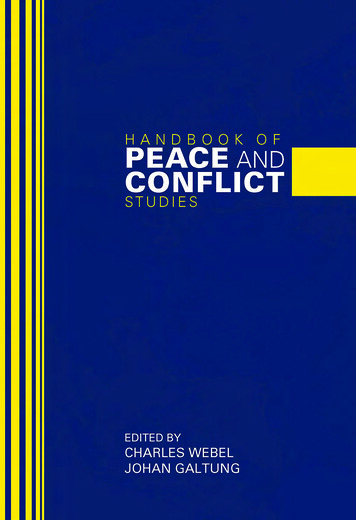
Transcription
Handbook of Peace andConflict StudiesThe fields of peace and conflict studies have grown exponentially since their initiation inScandinavia about a half century ago by Johan Galtung. They have forged a transdisciplinaryand professional identity distinct from security studies, political science and InternationalRelations.The Routledge Handbook of Peace and Conflict Studies offers a cutting-edge and transdisciplinaryoverview of the main issues, debates, state-of-the-art methods and key concepts in peace andconflict studies today. The volume is divided into four sections, commencing with ‘Understanding and Transforming Conflict’, moving sequentially through ‘Creating Peace’ and ‘Supporting Peace’, and culminating with ‘Peace Across the Disciplines’. Each section features newessays by distinguished international scholars and/or professionals working in peace studies andconflict resolution and transformation. Drawing from a wide range of theoretical, methodological and political positions, the editors and contributors offer topical and enduringapproaches to peace and conflict studies.This book will be essential reading for students of peace studies, conflict studies and conflictresolution. It will also be of interest and use to practitioners in conflict resolution and NGOs, aswell as policymakers and diplomats.Charles Webel is currently Fulbright Senior Specialist in Peace and Conflict Studies. During2005, he was Director of the Centre of Peace Studies and a professor of social science at theUniversity of Tromsø, Norway. He is the author of Terror, Terrorism, and the Human Condition(2005) and co-author with David P. Barash of Peace and Conflict Studies (2002).Johan Galtung is widely acknowledged as the founder of peace studies and peace research. Hehas published extensively in these fields. He is currently co-director of TRANSCEND, a globalnetwork of peace scholars and conflict transformers.
Handbook of Peace andConflict StudiesEdited byCharles Webel and Johan Galtung
First published 2007by Routledge2 Park Square, Milton Park, Abingdon, Oxon, OX14 4RNSimultaneously published in the USA and Canadaby Routedge270 Madison Avenue, New York NY 10016Routledge is an imprint of the Taylor and Francis Group, an informa businessThis edition published in the Taylor & Francis e-Library, 2007.“To purchase your own copy of this or any of Taylor & Francis or Routledge’scollection of thousands of eBooks please go to www.eBookstore.tandf.co.uk.” 2007 Selection and editorial matter Charles Webel and Johan Galtung; individual chapters,the contributorsAll rights reserved. No part of this book may be reprinted or reproduced or utilized in any form orby any electronic, mechanical or other means, now known or hereafter invented, includingphotocopying and recording, or in any information storage or retrieval system, without permissionin writing from the publishers.British Library Cataloguing in Publication DataA catalogue record for this book is available from the British LibraryLibrary of Congress Cataloging in Publication DataHandbook of peace and conflict studies / edited by Charles Webel and Johan Galtung.p. cm.Includes bibliographical references and index.1. Peace-building. 2. Conflict management. I. Webel, Charles. II. Galtung, Johan.JZ5538.H36 2007303.6′6—dc222006027025ISBN 0-203-08916-2 Master e-book ISBNISBN10: 0–415–39665–4 (hbk)ISBN10: 0–203–08916–2 (ebk)ISBN13: 978–0–415–39665–3 (hbk)ISBN13: 978–0–203–08916–3 (ebk)
ContentsList of IllustrationsNotes on ContributorsIntroduction1 Introduction: toward a philosophy and metapsychology of peaceCharles Webel2 Introduction: peace by peaceful conflict transformation – theTRANSCEND approachJohan Galtungviiiix1314Part 1: Understanding and transforming conflict3 Negotiation and international conflictFen Osler Hampson, Chester A. Crocker and Pamela R. Aall354 MediationSara Horowitz515 Former Yugoslavia and Iraq: a comparative analysis of international conflictmismanagementJan Oberg646 Peace studies and peace politics: multicultural common security inNorth–South conflict situationsKinhide Mushakoji86v
CONTENTS7 Disarmament and survivalMarc Pilisuk8 Nuclear disarmamentDavid Krieger94106Part 2: Creating peace9 Counselling and training for conflict transformation and peace-building:the TRANSCEND approachWilfried Graf, Gudrun Kramer and Augustin Nicolescou12310 Nonviolence: more than the absence of violenceJørgen Johansen14311 Human rights and peaceJim Ife16012 ReconciliationJoanna Santa-Barbara17313 Peace as a self-regulating processDietrich Fischer187Part 3: Supporting peace14 Gender and peace: towards a gender-inclusive, holistic perspectiveTony Jenkins and Betty A. Reardon20915 Peace business: an introductionJack Santa-Barbara23216 Peace JournalismJake Lynch and Annabel McGoldrick24817 Peace psychology: theory and practiceAntonella Sapio and Adriano Zamperini26518 Rethinking peace educationAlicia Cabezudo and Magnus Haavelsrud279Part 4: Peace across the disciplines19 Peace studies as a transdisciplinary projectChadwick F. Algervi299
CONTENTS20 The spirit of war and the spirit of peace: understanding the role of religionGraeme MacQueen31921 International law: amid power, order and justiceRichard Falk33322 The language-games of peaceAnat Biletzki34523 Peace and the artsPatrick McCarthy35524 Peace through health?Neil Arya367Part 5: Conclusion25 Peace and conflict studies: looking back, looking forwardJohan Galtung and Charles WebelIndex397401vii
List of .117.119.1Peace by peaceful conflict transformation: a TRANSCEND modelTen faultline dimensions and two levels of organizationPeace: negative and positive, direct, structural, culturalEight components of peaceSome examples of positive and negative feedback loopsSix defects of a feedback system, with possible remediesSome potential remedies against the six basic defects in socialfeedback systemsTraditional and peace business paradigmsGaltung’s tableDifferences between traditional psychology and peace psychologyFunctions appearing in names of UN Systems 7.117.218.118.219.1Rights and responsibilities: individual and collectiveThree interactional responses to an attackInteractive-emotional modelRelationships in time and spaceThe dialectics between theory and practiceEmergence of peace tools in the League of Nations and the UNsystem23.1 Paradise Now, silkscreen and paint on canvas24.1 Peace through health working model24.2 Breaking the chain of war: medical peace action in a framework ofpreventionviii169273275281285302365379383
Notes on ContributorsPamela R. Aall is Vice President for Education at the US Institute of Peace. She is alsoPresident of Women in International Security, an organization dedicated to promoting thevisibility and influence of women in foreign affairs. With Chester A. Crocker and Fen OslerHampson, she is co-editor of several books, including Turbulent Peace: The Challenges of ManagingInternational Conflict (2001) and Grasping the Nettle: Analyzing Cases of Intractable Conflict (2005).She also is co-author of Taming Intractable Conflicts: Mediation in the Hardest Cases (2004) and theGuide to IGOs, NGOs and the Military in Peace and Relief Operations (2000). Her research interestsinclude mediation in inter- and intra-state conflicts, non-official organizations in conflict management and resolution, and the role of education in exacerbating conflict and promotingreconciliation.Chadwick F. Alger is Mershon Professor of Political Science and Public Policy Emeritus, theOhio State University. His research and teaching has focused on three linked themes. First isthe development of long-term strategies for peace-building. He was Secretary General of theInternational Peace Research Association from 1984 to 1987. Second is the expanding peacebuilding roles of some 30 organizations in the UN system, with special interest in the roles ofNGOs/civil society. For a number of years he conducted extensive field research at the UNHeadquarters in New York City and at the headquarters of the UN and UN SpecializedAgencies in Geneva, Switzerland. Third is the world relations of people and organizations inlocal communities. He is author of The United Nations System: A Reference Manual (2006) andeditor of The Future of the UN System: Potential for the Twenty First Century (1998). He wasPresident of the International Studies Association, 1978–79.Neil Arya is a family doctor involved with projects on violence reduction in El Salvador (postconflict) and mental health in Palestine (active conflict). He has been a lecturer on Peacethrough Health both at McMaster and the University of Waterloo, and holds academic positions in Environment and Resource Studies at the University of Waterloo, and FamilyMedicine both at McMaster University and the University of Western Ontario. He has servedas President of Physicians for Global Survival and Vice President of International Physicians forthe Prevention of Nuclear War. Dr Arya has published on health effects of small arms andix
NOTES ON CONTRIBUTORSnuclear weapons, peace through health, a health-based model of security, as well as varioushealth and environmental issues. He is co-editor of a book with Joanna Santa Barbara on Peacethrough Health (forthcoming).Anat Biletzki is Professor of Philosophy, Tel Aviv University and was a former chairperson ofB’Tselem – the Israeli Information Centre for Human Rights in the Occupied Territories.Professor Biletzki’s research interests range from Wittgenstein and Hobbes to analytic philosophy, political thought and human rights. Her professional and philosophical activities converge in the area of human rights and she is often invited abroad – for public lecturing, forseminars at human rights conferences, for interviews, and for meetings with human rightscounterparts all over the world. Publications include Paradoxes (1996), Talking Wolves: ThomasHobbes on the Language of Politics and the Politics of Language (1997), What Is Logic? (2002) and(Over)Interpreting Wittgenstein (2003).Alicia Cabezudo, from Argentina, specializes in Education for Democracy, Cultures of Peace,and Human Rights, as rooted in recent Latin American history. She is Professor at the School ofEducation, University of Rosario, Argentina, and Education Coordinator at the UNESCOChair on Culture of Peace and Human Rights, University of Buenos Aires. Her recent publications include Educacion en Derechos Humanos. Un ejercicio para la Construccion de la Ciudadania(2006); Educacion para la Paz y los Derechos Humanos: un desafio actuala (2006); Learning to AbolishWar: Teaching toward a Culture of Peace, with Betty Reardon (2002); and ‘Tasks and directions forthe global campaign for peace education’, also with Betty Reardon, in Disarmament ForumNewsletter, Volume 3, United Nations Institute for Disarmament Research, Geneva (2001).Chester A. Crocker is James R. Schlesinger professor of strategic studies at the WalshSchool of Foreign Service, Georgetown University. He served as chairman of the board of theUnited States Institute of Peace (1992–2004), and continues as a member of its board. From1981 to 1989, he was US Assistant Secretary of State for African affairs. He is the author of HighNoon in Southern Africa: Making Peace in a Rough Neighborhood (1992), co-author (with Fen OslerHampson and Pamela Aall) of Taming Intractable Conflicts: Mediation in the Hardest Cases (2004)and co-editor of Grasping the Nettle: Analyzing Cases of Intractable Conflict (2005), Turbulent Peace:The Challenges of Managing International Conflict (2001) and Herding Cats: Multiparty Mediation ina Complex World (1999).Richard Falk is Albert G. Milbank Professor of International Law Emeritus, Princeton University and since 2002 Distinguished Visiting Professor, Global Studies, University of Californiaat Santa Barbara. He is also Chair of the Board, Nuclear Age Peace Foundation and on theeditorial board of The Nation and The Progressive. His recent books include a co-edited volume,Crimes of War: Iraq (2006). The Decline of World Order: America’s Neoimperial Foreign Policy (2004)and The Great Terror War (2003).Dietrich Fischer is Academic Director of the European University Centre for Peace Studies,Burg Schlaining, Austria. He is a former MacArthur Fellow in International Peace and SecurityStudies at Princeton University and Co-Director of TRANSCEND. He is the author ofPreventing War in the Nuclear Age (1984) and Non-Military Aspects of Security: A Systems Approach(1993) and co-author of Warfare and Welfare: Integrating Security Policy into Socio-Economic Policy(with Nobel Laureate Jan Tinbergen, 1987), Winning Peace: Strategies and Ethics for a Nuclear-FreeWorld (with Wilhelm Nolte and Jan Oberg, 1989), and Conditions of Peace: An Inquiry (withx
NOTES ON CONTRIBUTORSGrace Boggs et al., 1991). He has been a consultant to various United Nations agencies onissues of disarmament and development.Johan Galtung is a Professor of Peace Studies and the founder and Co-director of TRANSCEND: A Peace and Development Network. Born in Oslo, Norway, he has doctorates inmathematics and sociology. He is the founder of the International Peace Research Institute,Oslo, and of the Journal of Peace Research. His recent book publications include: Human Rights inAnother Key (1994); Peace By Peaceful Means (1996); Conflict Transformation by Peaceful Means(1998, 2000); Searching for Peace (with Carl G. Jacobsen and Kai Frithjof Brand-Jacobsen)(2000); Rethinking Conflict: The Cultural Approach (2002); ‘Democracy works: people, expertsand the future’ (with Håkan Wiberg, eds), FUTURES, Special Issue, March 2003; USA Glasnost(with Rick Vincent) (2003); Transcend & Transform (2004); and Pax Pacifica: The PacificHemisphere and Peace Studies (2005).Wilfried Graf holds a PhD in Sociology. He is Senior Researcher at the Institute for Sociologyof Law and Criminology and Co-Director of the Institute for Integrative Conflict Transformation and Peacebuilding in Vienna, Austria. Between 1983 and 2005, he was Senior Researcherat the Austrian Study Centre for Peace and Conflict Resolution. Currently he is conductingdialogue workshops in order to support the peace process in Sri Lanka, and is also engaged insimilar projects in Central Asia, the South Caucasus and West Balkans. Dr Graf is a lecturer andtrainer at numerous universities and academies. His main research interests are the study ofculture and the collective unconscious in processes of violence, war, peace and conflicttransformation.Magnus Haavelsrud is a Professor of Education at the Norwegian University of Science andTechnology in Trondheim, Norway. His work deals with the critique of the reproductive roleof education and the possibilities for transcendence of this reproduction in light of the traditions of educational sociology and peace research. His publications include Education in Developments (1996); Perspectives in the Sociology of Education (1997, 2nd edition); Education Within theArchipelago of Peace Research 1945–1964, co-authored with Mario Borrelli (1993); Disarming:Discourse on Violence and Peace, editor (1993); and Approaching Disarmament Education, editor(1981).Fen Osler Hampson is the Director of the Norman Paterson School of International Affairs,Carleton University, Ottawa, Canada. His books include Taming Intractable Conflicts: Mediation inthe Hardest Cases (2005), Grasping the Nettle: Analyzing Cases of Intractability (2005), Madness in theMultitude: Human Security and World Disorder (2002). Turbulent Peace: The Challenges of ManagingInternational Conflict (2001). Herding Cats: Multiparty Mediation in a Complex World (1999). Nurturing Peace: Why Peace Settlements Succeed or Fail (1996). Multilateral Negotiations: Lessons FromArms Control, Trade and the Environment (1995 and 1999) and Unguided Missiles: How AmericaBuys Its Weapons (1986).Sara Horowitz is a Professor of Negotiation in the School of Agriculture of the University ofBuenos Aires. She is a TRANSCEND member and Co-Director of the TRANSCENDPeace University, mediator and peace worker. She is Secretary of the Latin American branch ofIPRA, the International Peace Research Association. She is the author of six books in Spanish,dealing with adoption; mediation in general; mediation at school; community; and peace inschool.xi
NOTES ON CONTRIBUTORSJim Ife has been Professor and Head of Department of Social Work and Social Policy at boththe University of Western Australia and Curtin University. He was the inaugural Head ofthe Centre for Human Rights Education, and Haruhisa Handa Professor of Human RightsEducation, at Curtin University, until his retirement in 2006. He has published in the fields ofcommunity development and human rights, and his books include Community Development(3rd ed. 2006) and Human Rights and Social Work (2001). He is a former Chair of AmnestyInternational Australia.Tony Jenkins is the Co-Director of the Peace Education Center at Teachers College,Columbia University and the Global Coordinator of the International Institutes on PeaceEducation (IIPE). He has extensive consultative experience, including work with universities,NGOs and several UN agencies. His current work focuses on pedagogical research and educational design and development, with special interest in alternative security systems, disarmament and gender. Among his recent publications are ‘Disarming the system, disarming themind’, in Peace Review (2006) and ‘A peace education response to modernism: reclaiming thesocial and pedagogical purposes of academia’, in Jing Lin and Christa Bruhn (eds) Educators asPeacemakers: Transforming Education for Global Peace (in press).Jørgen Johansen is a freelance peaceworker, lecturer and researcher. He is affiliated with theTranscend Peace University, and the Centre for Peace and Reconciliation Studies, CoventryUniversity. He is author of Bombemålet Norge, Atomstrategi, Ytringsfrihet og Razzia [Norway theBombtarget, Nuclear Strategy, Freedom of Speech and Police Raid] (1984); Aldri Mer 9. April[Never More April 9] (1987); Socialt Försvar – en ickevåldsrevolution [Social Defence – A nonviolent Revolution] (1990); Den Nødvendige Ulydigheten [The Necessary Disobedience] (with ÅsneBerre Persen, 1998); and Sosialt Forsvar, ikkevoldskamp mot vår tids trusler [Social Defence,Nonviolent Struggle Against the Threats of Our Time] (2000).Gudrun Kramer is Co-Director of the Institute for Integrative Conflict Transformation andPeacebuilding in Vienna, Austria and Co-Director of TRANSCEND International. Between1999 and 2005, she was Programme Director for projects related to conflict regions at theAustrian Study Centre for Peace and Conflict Resolution. Ms Kramer was also responsiblefor the training courses that are designed to prepare civilians for peace-building activities incrisis areas. Currently she is conducting dialogue workshops in order to support the peaceprocess in Sri Lanka, and is also engaged in similar projects in Central Asia, the SouthCaucasus and West Balkans. She is a lecturer and trainer at numerous universities andacademies.David Krieger is a founder of the Nuclear Age Peace Foundation, and has served as Presidentof the Foundation since 1982. Under his leadership the Foundation has initiated many innovative and important projects for building peace, strengthening international law and abolishingnuclear weapons. He is the author of many studies of peace in the nuclear age, including thebook Nuclear Weapons and the World Court (1998).Jake Lynch is Director of the Centre for Peace and Conflict Studies at Sydney University.With Annabel McGoldrick, he is the joint author of Peace Journalism (2005) and many bookchapters and articles about conflict, peace and the ethics of reporting. He is a member ofthe Toda Institute working group on Peace Journalism and a founder member of thePeace Journalism commission of the International Peace Research Association. He wasxii
NOTES ON CONTRIBUTORSpreviously a senior international journalist, having worked as a Political Correspondent for SkyNews, Sydney Correspondent for the Independent newspaper and a news anchor for BBCWorld.Graeme MacQueen taught Buddhist text and narrative in the Religious Studies Departmentof McMaster University for 30 years. In 1989, he became founding Director of the Centre forPeace Studies at McMaster, after which he helped develop an undergraduate programme inPeace Studies and co-directed a peace-building programme with projects in Sri Lanka, Gaza,Serbia and Afghanistan. He has published numerous peer-reviewed articles and book chapters,as well as three books, including a novel.Patrick McCarthy is a painter and sculptor, living in Los Angeles. Besides his daily painting,he is also at work on a philosophical manuscript entitled ‘Supreme Happiness’, as well asa fictional narrative about an artist going about his life in Los Angeles. His website is:patrickmccarthygallery.com.Annabel McGoldrick is an experienced international reporter in television and radio news.She has covered conflicts in the Philippines, Indonesia and Israel Palestine. She produced theBBC documentary, ‘Against the War’, with Harold Pinter, during the NATO bombing ofYugoslavia in 1999. With Jake Lynch, she is the joint author of Peace Journalism (2005) and manybook chapters and articles about conflict, peace and the ethics of reporting. She has taught inthe universities of Sydney, and Queensland, Australia. Annabel is a qualified psychotherapistwith a special interest in journalism and trauma.Kinhide Mushakoji, Director of the Peace Research Institute at Meiji Gakuin University inTokyo, was Vice Rector for Regional and Global Studies at the United Nations University inTokyo from 1976 to 1989. He is a Japanese authority on international affairs and particularlyinterested in peace research. He is the former Director of the Institute for International Relations at Sophia University in Tokyo, which he founded in 1969, a year after joining the Sophiafaculty. He has been a Visiting Professor at Princeton and Northwestern Universities in theUSA and subsequently a Senior Scholar at the East West Center in Hawaii and Consultant tothe Commission on Society, Development and Peace in Geneva. He was Vice President of theInternational Political Science Association. Among his publications are ‘Introduction to PeaceResearch’, ‘Japanese Foreign Policy in a Multi-Polar World’, and ‘Behavioral Science andInternational Politics’.Augustin Nicolescou is Project Coordinator and Researcher at the Institute for IntegrativeConflict Transformation and Peace-building in Vienna, Austria. He is the coordinator of theIICP dialogue workshops for the support of the peace process in Sri Lanka. Mr Nicolescoureceived his BA in Political Science from McGill University in Montreal, Canada and his MAin Peace and Conflict Studies from the European University Centre for Peace Studies inStadtschlaining, Austria. His current research focus is on the role of networks, norms and trustin conflict transformation processes.Jan Oberg is co-founder and Director of the Transnational Foundation for Peace and FutureResearch, TFF, in Lund, Sweden (www.transnational.org). His main books are Myth About OurSecurity, To Develop Security and Secure Development, Winning Peace (co-author) and PredictableFiasco: The Conflict with Iraq and Denmark as an Occupying Power (2004).xiii
NOTES ON CONTRIBUTORSMarc Pilisuk is Professor Emeritus, the University of California, and a Professor at theSaybrook Graduate School and Research Center. He is the author of International Conflict andSocial Policy (1972); The Healing Web: Social Networks and Human Survival (1986); The TripleRevolution: Social Problems in Depth (1968); Triple Revolution Emerging (1971); Poor Americans: Howthe White Poor Live (1971); and How We Lost the War on Poverty (2005).Betty A. Reardon is a peace educator with a half century of experience in the field. She is thefounding Director of the Peace Education Center at Teachers College Columbia Universityand of the International Institute on Peace Education, an international experience in peaceeducation offered annually, each year in a different world region. She has taught at all levels offormal education. Her work has been in the development of pedagogies relevant to the substance and purposes of peace knowledge, with emphasis on gender issues, human rights andhuman security. Among her many publications are Sexism and the War System (1985) andEducation for a Culture of Peace in a Gender Perspective (2001).Jack Santa-Barbara is currently Director of the Sustainable Scale Project, an NGO focusingon the relationship between economic theory and practice and the biophysical limits of globalecosystems. He is also an Associate of the Centre for Peace Studies at McMaster University inHamilton, Ontario, and a Member of Transcend: A Peace and Development organization. He isco-author, with Johan Galtung, of Peace Business: The Role of Business in Reducing Violence,Inequity and Ecological Degradation, (in press).Joanna Santa-Barbara is affiliated with the Department of Psychiatry and Centre for PeaceStudies, McMaster University, Hamilton, Ontario, Canada, as well as with Physicians for GlobalSurvival Canada, Science for Peace and TRANSCEND. Her research interests include conflicttransformation, Peace through Health and the impact of war on children. Publications includePeace through Health (forthcoming).Antonella Sapio is a medical doctor, child neuropsychiatrist and social psychologist.Currently, she is Professor of Peace Psychology at the University of Florence in Italy. She is theauthor of many scientific publications, including the important volume Per una Psicologia dellaPace (2004, ed. F. Angeli). She has founded, together with other collegues, the Società Italiana diScienze Psicosociali per la Pace [Italian Society of Psychosocial Sciences for Peace] (SISPa) andis involved in many activities for peace, emphasizing the promotion of a culture of nonviolencein institutional peacebuilding.Charles Webel is currently a Fulbright Senior Specialist in Peace and Conflict Resolution.Previously, he was Director of the Centre for Peace Studies at the University of Tromsø,Norway, and was a Guest Professor at the UNESCO Chair for the Philosophy of Peace at theUniversity of Castellon, Spain. He studied and taught at Harvard University and at the University of California at Berkeley, and is a research graduate of the Psychoanalytic Institute ofNorthern California. He is author of Terror, Terrorism, and the Human Condition (2004), coauthor (with David Barash) of Peace and Conflict Studies (2002), and has published widely inphilosophy, psychology, and social science journals. He has also been active in many peaceorganizations, having also served as West Coast Secretary of Concerned Philosophers of Peace.Adriano Zamperini is Professor of Social Psychology at the University of Padua, Italy.The promoter of many scientific and cultural initiatives on peace, together with otherxiv
NOTES ON CONTRIBUTORScolleagues he has founded the Società Italiana di Scienze Psicosociali per la Pace [Italian Societyof Psychosocial Sciences for Peace] (SISPa), of which he is the President. His books includePsicologia sociale della responsabilità: Giustizia, politica, etica e altri scenari [Social Psychology ofResponsibility: Justice, Politics, and Other Scenarios] (1998); Psicologia dell’inerzia e della solidarietà: Lo spettatore di fronte alle atrocità collettive [Psychology of Inertia and Solidarity: TheBystander Before Collective Atrocities] (2001); and Prigioni della mente. Relazioni di oppressione eresistenza [Mind Prisons: Oppression and Resistance Reports] (2004).xv
Introduction
1IntroductionToward a philosophy and metapsychology of peaceCharles WebelThe importance of securing international peace was recognized by the really great men of formergenerations. But the technical advances of our times have turned this ethical postulate into a matterof life and death for civilized mankind today, and made the taking of an active part in the solutionto the problem of peace a moral duty which no conscientious man can shirk.(Albert Einstein 1984: 43)Although attempting to bring about world peace through the internal transformation of individuals is difficult, it is the only way. . . . Peace must first be developed within an individual. And Ibelieve that love, compassion, and altruism are the fundamental basis for peace. Once these qualitiesare developed within an individual, he or she is then able to create an atmosphere of peace andharmony. This atmosphere can be expanded and extended from the individual to his family, fromthe family to the community and eventually to the whole world.(Dalai Lama, in Thich Nhat Hanh 1991: vii)If we begin with the need to survive, we immediately see that peace is a primary requirement of thehuman condition itself.(Johan Galtung, in Galtung and Ikeda 1995: 110)Love, work, and knowledge are the well-springs of our life. They should also govern it.(Wilhelm Reich 1971: Epigraph)Nonviolence is a weapon of the strong. . . . The law of love will work, just as the law of gravitationwill work, whether we accept it or not. . . . The more I work at this law the more I feel the delightin life, the delight in the scheme of the universe. It gives me a peace and a meaning of the mysteriesof nature that I have no power to describe.(M. K. Gandhi 1930/2002: 46)The history of human civilization shows beyond any doubt that there is an intimate connectionbetween cruelty and the sexual instinct; but nothing has been done towards explaining theconnection, apart from laying emphasis on the aggressive factor in the libido.(Sigmund Freud 1905/1989: 252)3
CHARLES WEBELAnd how long shall we have to wait before the rest of mankind becomes pacifists too? There is notelling. . . . But one thing we can say: whatever fos
Handbook of Peace and Conflict Studies The fields of peace and conflict studies have grown exponentially since their initiation

